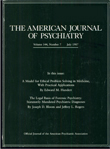DST Studies in Psychotic Depression: A Meta-Analysis
Abstract
OBJECTIVE: Although hypersecretion of cortisol has frequently been reported in psychotic depression, the findings have been mixed. The authors performed a meta-analysis of the existing studies to determine the significance of differences in nonsuppression of cortisol across studies. METHOD: Fourteen studies that compared dexamethasone suppression test (DST) results in psychotic and nonpsychotic patients were examined, and a Mantel-Haenszel meta-analysis was performed. For comparison purposes, 19 studies of the DST with respect to melancholic/nonmelancholic and inpatient/outpatient distinctions were similarly reviewed. RESULTS: This analysis indicated a highly significant probability that a greater rate of cortisol nonsuppression occurs in psychotic depression. The nonsuppression rate was substantially higher in patients with psychotic depression (64%) than in nonpsychotic patients (41%). In the 19 studies of melancholia, nonsuppression was less frequent (36%), and when inpatient/outpatient status was controlled, melancholic depression was not significantly associated with nonsuppression. In nonmelancholic outpatients with major depression, the nonsuppression rate was low (12%). CONCLUSIONS: Among patients with major depression, psychotic depression is the subtype that is most closely associated with nonsuppression of cortisol on the DST. Hypercortisolemia is usually present in psychotic depression and may be important in understanding the pathophysiology of this syndrome. (Am J Psychiatry 1997; 154:1497–1503)



